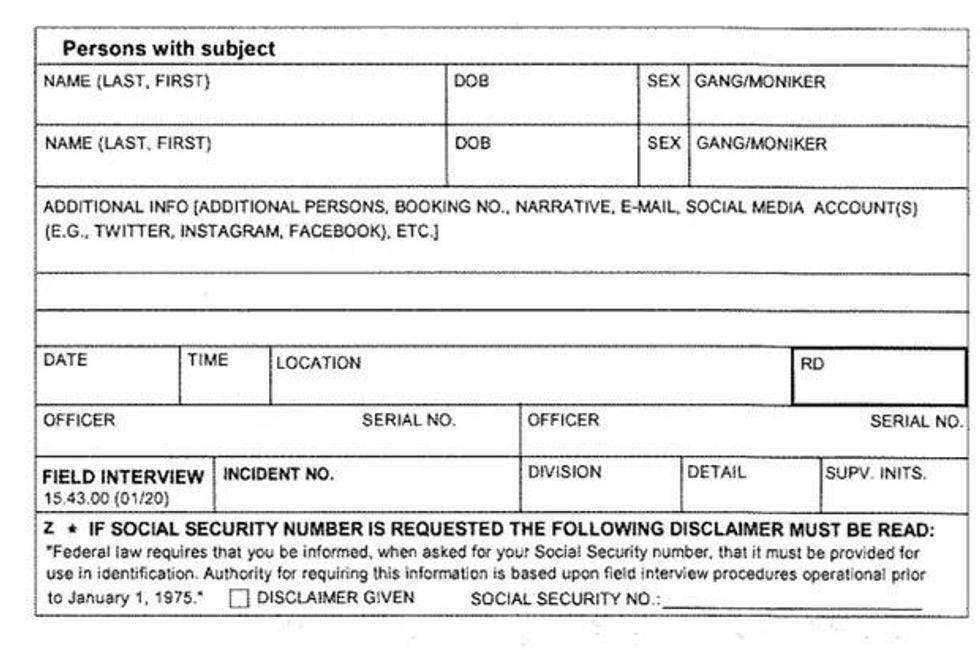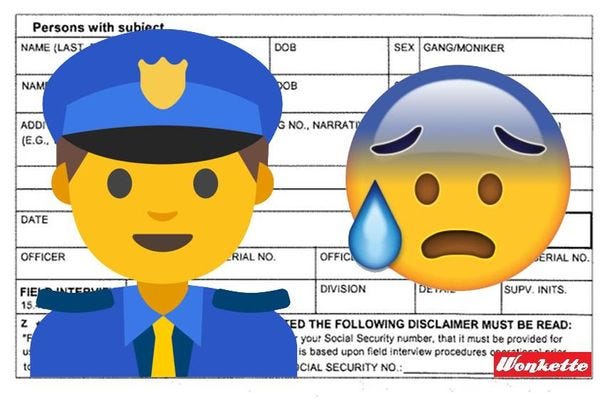LA Police Want To Friend You On All Social Media, Whether You Want To Or Not
But surely they wouldn't misuse our online information!
Turns out we don't need to worry about those microchips in the coronavirus vaccines being used to track our movements, not only because that's bullshit, and also not only because if police want your cell phone data, they can get a warrant. (McDonalds, on the other hand, has your location information because you traded it for buy-one-get-one-free Filet o' Fish sammiches.) But as the Guardian reports, the Los Angeles Police Department may already have some of the information it wants, since police routinely collect social media information from ordinary people they interview, even if they're only witnesses to a crime or not involved in anything shady at all.
We are so reassured that the LAPD is doing internet surveillance, because surely a department that has decades of experience spying on and discriminating against protesters and people of color and protesters of color has learned its lesson, and wouldn't dream of misusing social media information it collects. It would be so embarrassing for them, after all.
The Guardian , using documents obtained through public records requests and a lawsuit by the Brennan Center for Justice , reports that
"field interview cards" that police complete when they question civilians reveal that LAPD officers are instructed to record a civilian's Facebook, Instagram, Twitter and other social media accounts, alongside basic biographical information. An internal memo further shows that the police chief, Michel Moore, told employees that it was critical to collect the data for use in "investigations, arrests, and prosecutions", and warned that supervisors would review cards to ensure they were complete.
Brennan Center deputy director Rachel Levinson-Waldman said this is all rather concerning from a civil liberties perspective, because once police know your online identity, they can start sifting through your friends list and posts, just to keep an eye on you. For public safety, of course.
"It allows for a huge expansion of network surveillance," said Levinson-Waldman, noting how police and prosecutors have previously used Facebook photos and "likes" to make dubious or false allegations of criminal gang activity.
Hamid Khan, of the Stop LAPD Spying Coalition, is concerned about the LAPD sharing such information with federal law enforcement, not to mention plain old snooping on people, particularly those dangerous folks who might protest police abuses, for instance.
"This is like stop and frisk," he said, of the use of field interview cards. "And this is happening with the clear goal of surveillance." The LAPD, he noted, has allowed officers to pose undercover to investigate groups , meaning officers can create fake social media accounts to infiltrate groups.
Oh yes, and then there's the lying, too!
The copies of the cards obtained by the Brennan Center also revealed that police are instructed to ask civilians for their social security numbers and are advised to tell interviewees that "it must be provided" under federal law. Kathleen Kim, a Loyola law professor and immigrants' rights expert, who previously served on the LA police commission, said she was not aware of any law requiring individuals to disclose social security numbers to local police.
Kim pointed out that, what with LA supposedly being a sanctuary city, demanding people's SSNs could be one way of identifying whether someone is a citizen, which, under LAPD policy, is supposed to be something cops avoid.

Happily, the press attention seems to have had a possible good outcome; the Guardian says that Tuesday, the LAPD explained that "the fieldinterview card policy was 'being updated,' but declined to provide further details." So maybe yay?
The Brennan Center's document request also turned up information on LAPD contracts with social media monitoring companies, which appeared to be aimed at investigating troublemakers who protested police brutality. Just as a reminder to you junior lawpersons out there, peaceful protest is one of those "constitutional rights" that's supposed to be a pretty big deal in the USA, so it's a tad disturbing to see that LAPD worked with a company called GeoFeedia, which "partners with law enforcement and has previously marketed itself as a tool to monitor BLM protests."
One internal document, which is undated but appeared to be several years old, listed the "keywords" and hashtags that the LAPD appeared to be monitoring through Geofeedia – and they were almost exclusively related to Black Lives Matter and similar leftist protests. It included #BLMLA, #SayHerName, Sandra Bland, Tamir Rice, #fuckdonaldtrump and the names of people killed by LA police that prompted major protests.
Hope you're ready for a surprise: The list of hashtags and search terms didn't include any related to violent rightwing groups, nope. Not even #VeryFinePeople.
The Guardian notes that the LA city attorney's office said the police department stopped using Geofeedia around 2017; the Brennan Center explains that was because
Geofeedia lost access to Twitter and Facebook data after public records requests from the ACLU of Northern California showed that Geofeedia and similar companies were pitching their products as resources to surveil lawful protesters against police violence.
See, Big Tech really does censor patriotic American companies that simply want to surveil Americans who think they have rights.
Dr. Melina Abdullah, the co-founder of Black Lives Matter LA, was about as aghast as you'd expect:
"They're following Black protesters who are organizing to stop violence and saying, 'Stop killing us' … And are they turning a blind eye to those who are actually violent: the white supremacist organizations that are growing in number?"
Other documents show the LAPD is continuing to look for technology that will help it crack down on crime, regardless of whether it's potential crime by the city's Black residents or potential crime by the city's Hispanic residents.
One firm with an LAPD contract, Media Sonar, said it could help the LAPD "stay on-top of drug/gang/weapon slang keywords and hashtags" and prevent crime, and bragged it's able to provide a "full digital snapshot of an individual's online presence including all related personas and connections," which does not sound at all worrisome, not at all.
Look, if you people don't want the police watching you, you can just write letters, OK? It's a lost art, so perhaps the LAPD will inspire a literary renaissance, the end.
[ Guardian / Brennan Center ]
Yr Wonkette is funded entirely by reader donations. If you can, please money us! Your information is safe with us, because we barely even know who you are on Disqus and we're terrible with names anyway.
Do your Amazon shopping through this link, because reasons .




Being disabled and in chronic pain that keeps me awake many nights, I've discovered that the one bonus is being able to do deep dives into subjects I'm interested in. At least my mind can stay strong if my body can't.
Best of luck with the chemo; I hope everything goes well for you.
"Authority for requesting this information is based upon field interview procedures operational prior to January 1, 1975."
So what exactly does that mean? Those procedures were no longer authorized after 1/1/1975? Regardless, were those procedures valid then or now? Are they saying they've been lying to people about Federal law requiring SSNs for identification for 45+ years?
Despite everyone and their brother using SSNs as ID for everything, I seem to recall a disclaimer from the Feds saying it should not be used as ID except for tax and SS purposes.